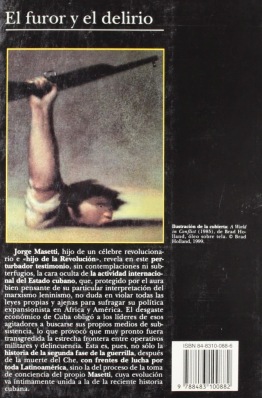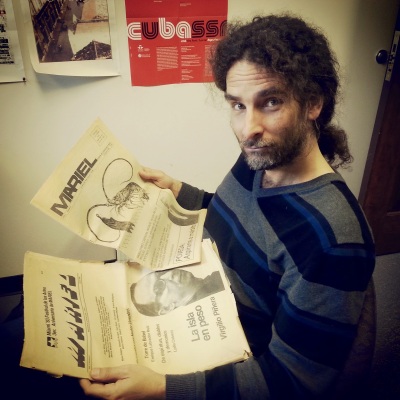Grown in Exercises of Death, Wendy Guerra (Taken from her blog HABÁNAME)
I have death as white and truth far away… – Don’t give me your fresh roses; I am terrible for roses. Give me the ocean…Dulce María Loynaz
Death, solicitous and vigilant followed me until my fall. It was my companion – solicitous and loving – Rafaela Chacón Nardi
Dreadful voice in funeral I mourn, that flies from the seas of my homeland to the beaches of Iberia; sadly confused the wind delays it; the sweet song in my throat freezes and shadows of pain cover my mind. Ah, that suffering voice, that America denotes with its pity and on these beaches the ocean casts, “He died,” is uttered, “the ardent patriot…” “He died”, repeated “the Cuban troubador.” And a sad echo moans in the distance, “the sublime singer from Niagara died!” – Gertrudis Gomez de Avellaneda
I carry the subject of death very badly. I bow before death with too much grief. Just by peering at a roof I can fall overwhelmed by fear.
This week I wake with the memory of those who have passed on. My parents, my friends, my poets, my personal saints.
The soul, the body, the emptiness, the abandonment or slipstream that our most beloved dead leave, fight within me with severe injuries.
This week the world’s newspapers talk about death, confinement, the hunger strikes in my country. My head and my body are trapped in a bird cage that is the act of dying.
For many cultures it is a cycle that is closed to open other cycles that are clear and bright. This is the way I should see it, as death to me appears to be the end of everything. But death weighs me down and casts me toward a powerful darkness.
It always appeared normal to me that someone would decide to die rather that live indefinitely with an incurable illness. Always, even when the dilemma of euthanasia touched me closely. I looked at the still living body of my mother, looked at her face and closed myself off from any possibility other than finding a miracle or unearthing a hope. I convinced myself that in the care of the body that still flutters before us, hope lives.
The cage of life opens.
I mishandle death but one must confront it. Six Marches back, I had surrendered before my mother on the day of her death.
Between wreaths of flowers, ritual lamenting, condolences or visits to the terminally ill I am rendered defenseless.
I do not support the death penalty. I regret each day of a hunger strike.
In my adolescence I dreamed of the same firing squad. I could not see the faces. I heard the gun shot and saw the gray walls full of bullet holes. The nightmare recurred for years.
I am well aware. We have called it so much that we should not be surprised when it appears. Every day, from a very young age, we repeated that phrase in which we had to choose between homeland or death. We swore to be like a man who had already died, and in that death we placed all of the energy of our growth. “Pioneers for communism, we will be like El Che.”
The busts, the hymns, the patriots, the names of long lost heroes and martyrs that our schools had. Every October the flowers in the ocean for Camilo.
We made long lines to see coffins of the dead arriving from wars distant to the island.
We are a culture that has not prepared itself for death, but which names it easily. We do not celebrate the day of the dead as a Mexican could, but we mention it daily like a mantra, staring it in the face like a permanent possibility.
In the 80s, during the events that took place in Granada, we listened to the official narrative of a false sacrifice. Its protagonists, lost in a place far away from the homeland, died fighting wrapped in an enormous Cuban flag. Such a strong image that still overwhelms us. Even though life and the homeland are for me a very real presence, luminous, fertile, continuous and above all everlasting, they are imposed upon us constantly in contrast with death.
Many slogans have a context, but our emphasis on suffocation, in the “no exit,” has welded us to an immobility that leads to DEATH.
“Homeland or death, we will overcome.”
“Whoever attempts to take over Cuba will collect the dust of its soil drenched in blood if they do not perish in the struggle.”
“Our dead lifting up their arms will still know how to defend it.”
“Even after death we are useful”
“Everyone will cry,'”it will be better to drown at sea than to betray the glory that has been lived.'”
At nine years old I imagined “drowning at sea” as the action of pulling a lever that would trigger a huge whirlpool that would drag us to the very bottom of the ocean. My mother would explain that this was a metaphor, but I kept on seeing myself at the bottom, with everything and homeland.
At the Malecon, between the U.S Interests Section in Cuba and our everyday lives, waves a sea of black flags.
A number of our friends lost their parents in the wars in Africa.
The family farewells on the shore, those goodbyes that guaranteed the possibiity of a voyage, marked the 90s during the exodus of the balseros [rafters].
Headlines from my childhood: attacks, sabotages, threats, epidemics. Our parents were paying eternally for a day to come for the Militias of Territorial Troops that would defend us.
The popular tunnels, the rifle ranges, the war reserves. Special Period in Times of Peace. Evacuation plan. Trenches. Air Sirens. “Every Cuban should learn to shoot and to shoot well.” Military preparation as a subject and a military concentration at the end of our university years were essential for being able to earn your degree. In short, the daily possibility of a war, of death. The speeches partially revealed its imminence, which at the time we felt to be very close, at our side. Death has been a small sheet that unites us or separates us.
A guaguanco permeates the air and says that death is calling us. Some torn boleros prefer death in their endings. How many marvelous songs, classics that we will not forget even in death, speak of death.
I ask myself why the hell I just can’t get used to its presence.
In the news and analysis these days death is mentioned as a possible solution. Is it over death that we should constuct the fullness of life? Hunger becomes death and death is part of a hunger that brings about in us emptiness, weakness, mourning.
I want to learn how to transform life from life itself.
I just can’t get used to death. In the cemeteries, where I can go visit a majority of my loved ones, I seek and take communion with life which opens before me underneath the angels and marble cracks. I should greet death normally, but I cannot remain calm in front of it. I love the manner in which Tomas Gutierrez Alea recreated death, relating it with our everyday life, traversing around with her presence.
Today I think of my mother Oya, so attached to Iku, divinity of death. I look toward the street. I keep thinking that Oya fosters the seasons, the strong winds and hurricanes, the lightning strikes and sparks. She symbolizes a violent and rash temperament and lives at the door of the cemeteries. She represents the intensity of gloomy sentiments, the world of the dead. She is the complete reincarnation of ancestors, the lack of memory and feeling of regret in women. The flag, the skirts, and the cloths of Oya are a combination of all the colors…except black.
I ask Oya to help me understand death, because it stalks us, and now runs at our pace. We have invoked it many times, named it, have alluded to it, and now that it is before us and presents itself, what to do? Those who have called it should receive it.
Now, what face are we going to put on death?
Translated by: Marlena Papavaritis and anonymous.







